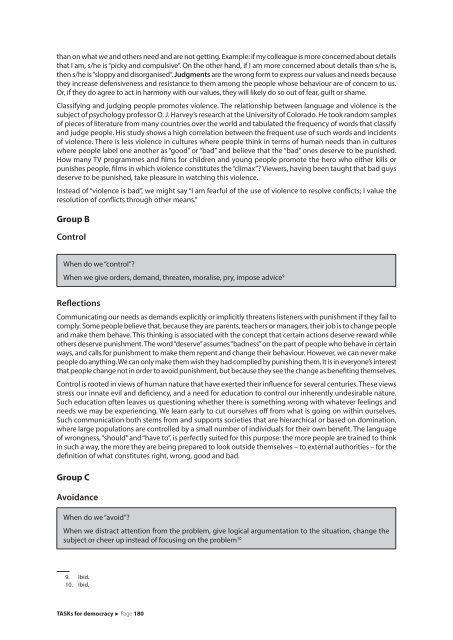TASKs for democracy
4NYw4W
4NYw4W
Create successful ePaper yourself
Turn your PDF publications into a flip-book with our unique Google optimized e-Paper software.
than on what we and others need and are not getting. Example: if my colleague is more concerned about details<br />
that I am, s/he is “picky and compulsive”. On the other hand, if I am more concerned about details than s/he is,<br />
then s/he is “sloppy and disorganised”. Judgments are the wrong <strong>for</strong>m to express our values and needs because<br />
they increase defensiveness and resistance to them among the people whose behaviour are of concern to us.<br />
Or, if they do agree to act in harmony with our values, they will likely do so out of fear, guilt or shame.<br />
Classifying and judging people promotes violence. The relationship between language and violence is the<br />
subject of psychology professor O. J. Harvey’s research at the University of Colorado. He took random samples<br />
of pieces of literature from many countries over the world and tabulated the frequency of words that classify<br />
and judge people. His study shows a high correlation between the frequent use of such words and incidents<br />
of violence. There is less violence in cultures where people think in terms of human needs than in cultures<br />
where people label one another as “good” or “bad” and believe that the “bad” ones deserve to be punished.<br />
How many TV programmes and films <strong>for</strong> children and young people promote the hero who either kills or<br />
punishes people, films in which violence constitutes the “climax”? Viewers, having been taught that bad guys<br />
deserve to be punished, take pleasure in watching this violence.<br />
Instead of “violence is bad”, we might say “I am fearful of the use of violence to resolve conflicts; I value the<br />
resolution of conflicts through other means.”<br />
Group B<br />
Control<br />
9<br />
When do we “control”?<br />
When we give orders, demand, threaten, moralise, pry, impose advice 9<br />
Reflections<br />
Communicating our needs as demands explicitly or implicitly threatens listeners with punishment if they fail to<br />
comply. Some people believe that, because they are parents, teachers or managers, their job is to change people<br />
and make them behave. This thinking is associated with the concept that certain actions deserve reward while<br />
others deserve punishment. The word “deserve” assumes “badness” on the part of people who behave in certain<br />
ways, and calls <strong>for</strong> punishment to make them repent and change their behaviour. However, we can never make<br />
people do anything. We can only make them wish they had complied by punishing them. It is in everyone’s interest<br />
that people change not in order to avoid punishment, but because they see the change as benefiting themselves.<br />
Control is rooted in views of human nature that have exerted their influence <strong>for</strong> several centuries. These views<br />
stress our innate evil and deficiency, and a need <strong>for</strong> education to control our inherently undesirable nature.<br />
Such education often leaves us questioning whether there is something wrong with whatever feelings and<br />
needs we may be experiencing. We learn early to cut ourselves off from what is going on within ourselves.<br />
Such communication both stems from and supports societies that are hierarchical or based on domination,<br />
where large populations are controlled by a small number of individuals <strong>for</strong> their own benefit. The language<br />
of wrongness, “should” and “have to”, is perfectly suited <strong>for</strong> this purpose: the more people are trained to think<br />
in such a way, the more they are being prepared to look outside themselves – to external authorities – <strong>for</strong> the<br />
definition of what constitutes right, wrong, good and bad.<br />
Group C<br />
Avoidance<br />
10<br />
When do we “avoid”?<br />
When we distract attention from the problem, give logical argumentation to the situation, change the<br />
subject or cheer up instead of focusing on the problem 10<br />
9. Ibid.<br />
10. Ibid.<br />
<strong>TASKs</strong> <strong>for</strong> <strong>democracy</strong> Page 180


